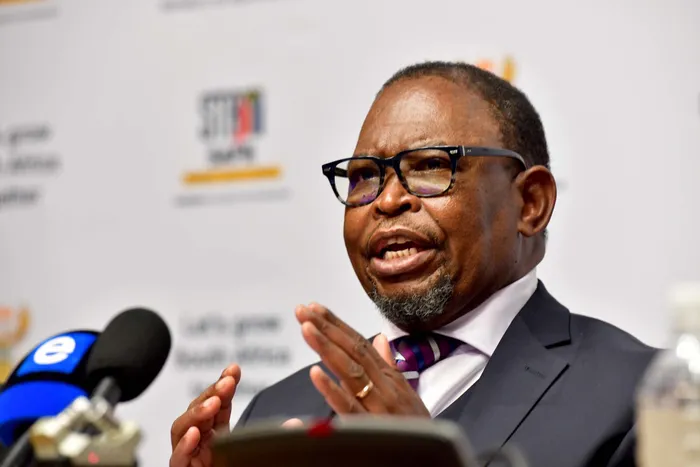Godongwana highlights debt vulnerabilities and global economic concerns at G20 summit
G20

Finance Minister Enoch Godongwana said that G20 Finance Track meetings are taking place as global economies face fragile economic growth and uncertainty continues to weigh heavily on economic growth.
Image: Elmond Jiyane / GCIS
Finance Minister Enoch Godongwana said that rising trade barriers, persistent global imbalances and new geopolitical risks were concerns for domestic economy.
Delivering his opening remarks at the G20 Finance Ministers and Central Bank Governors meeting, Godongwana said many developing countries, especially in Africa, remain burdened by high and rising debt vulnerabilities.
“They face constrained fiscal space and high cost of capital that limits their ability to invest in their people and their futures,” he said.
“Technological shifts, especially in artificial intelligence and digital finance, offer tremendous potential but also demand robust governance and coordinated action to harness the opportunity.”
Godongwana said that climate-related shocks and extreme weather events were also increasing in frequency and severity worldwide, impacti lives and macroeconomic stability.
“The curative impact of these cascading challenges is pushing the achievement of the Sustainable Development Goals (SDGs) by 2030 further out of reach. Developing countries face a staggering financing gap of $4 trillion (R71 trillion) every year,” he said.
“The message from the fourth Financing for Development conference in Spain was unequivocally that we need to act decisively, choose cooperation over fragmentation, unity over division and action over inaction.”
On the issue of multilateralism, Godongwana said the G20 had a critical role to play in strengthening and revitalising it by fostering inclusive dialogue, reinforcing rule-based cooperation and driving collective action in global challenges that no country can solve alone.
“Today we will consider pragmatic action to reform international financial architecture, how to scale up the mobilisation of infrastructural finance as well as how to strengthen international taxation,” he said.
“Tomorrow we will discuss the impediments to development in growth in Africa with a specific focus on macroeconomic vulnerabilities, weak institutions, poor infrastructure and high cost of capital. There will also be a discussion on the mobilisation of sustainable fin finance sector issues and financial inclusion.”
Godongwana said that these discussions should be entered with open minds, collective purpose and a determination to deliver progress.
“The need for bold cooperative leadership has never been as great as during these times.”
Lesetja Kganyago, the Governor of the South African Reserve Bank, warned of the headwinds for global economy as forecasts have been revised lower.
“Risks to the outlook have been tilted to the downside, while inflation has eased across countries, it remains higher than desired. Central banks have to skillfully navigate what uncertainty means for their financial stability mandates,” Kganyago said.
“These developments are unfolding under the backdrop of elevated debt and emerging risks on financial sustainability. According to the Organisation for Economic Co-operation and Development (OECD), the world has shifted to a new debt paradigm. Governments and companies are borrowing more than $10trln (R179trln) compared to the pre-COVID-19 period.
“At the same time, the Bank for International Settlements analysis shows that credit growth is now driven by more lending to governments than the private sector. This indicates persistently high deficits and fiscal pressure. This evolving landscape raises stakes on the interaction between fiscal and monetary policy, especially in avoiding fiscal dominance and maintaining financial stability.”
Kganyago said that preserving macroeconomic stability while supporting inclusive and sustainable growth remains crucial.
“We believe that if harnessed effectively, AI has the potential to revive productivity growth and improve living standards. As policymakers, our challenge is not simply to catch up but to ensure that the shift does not deepen inequality or destabilise fragile labour markets.”
BUSINESS REPORT